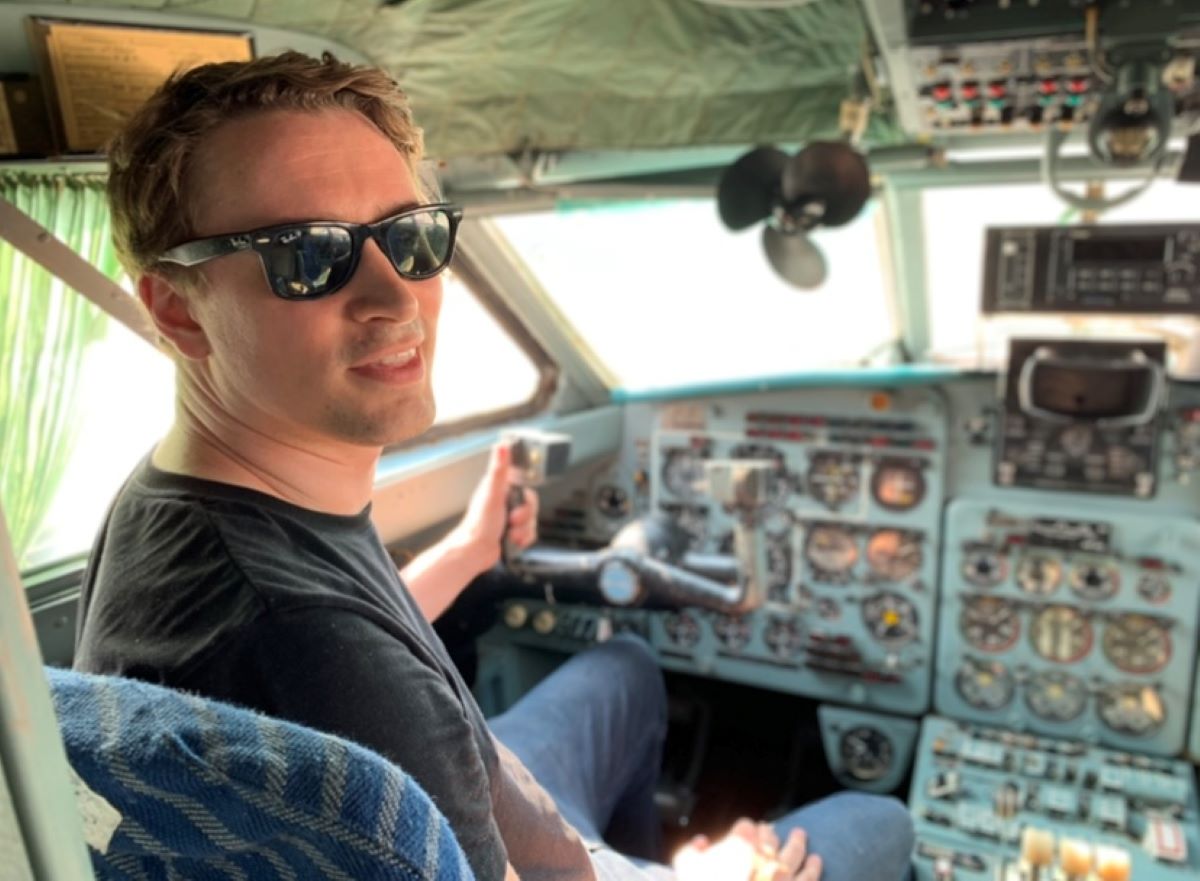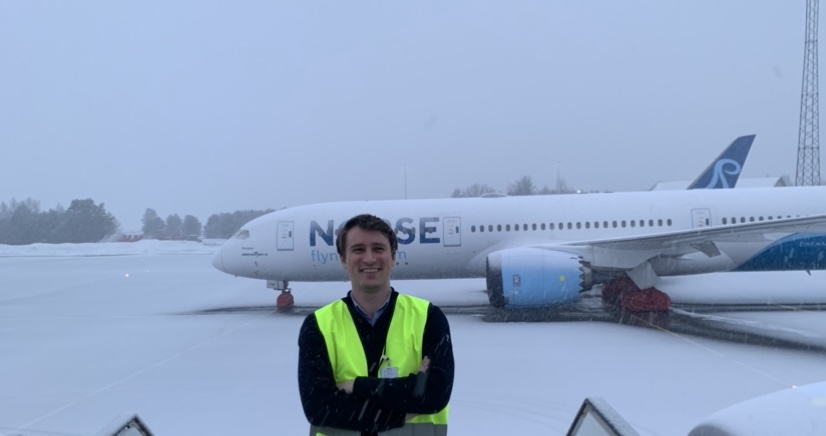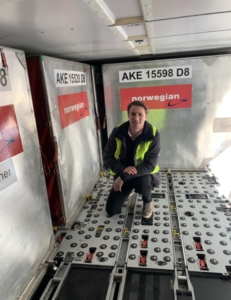Air Transport Management alumni stories: Norse Atlantic Airways VP Nick Redpath
13/07/2022

Nick Redpath is the Vice President of Product, Partnerships and Cargo at the newly-established airline, Norse Atlantic Airways. He graduated from Cranfield University with an MSc in Air Transport Management. Here, Nick talks about his family of aviators, the impact of studying at Cranfield, and fast-paced start-up life.
What sparked your interest in the air transport industry?
I come from a family of aviators – my grandfather was an engineer, working on the assembly line for the Vickers VC10; my mum was a stewardess at BOAC / British Airways, flying on VC10s; my uncle worked for BAC; my aunt worked on an RAF base – there’s a bit of a pattern! But mostly, as a child, the best part of any holiday for me was the flight there and the flight back. As I got older, the business of the industry started to interest me – I wanted to run the show!
Why did you choose Cranfield?
My first job was at Emirates in the marketing department – I’d heard about the course and reached out to two very senior colleagues who were graduates of the Cranfield Air Transport Management MSc. Their answers were very simple: “Don’t hesitate! Apply now. It will change your life.” Who was I to argue with that?
How did you find the course? What were the highlights?
I made a bunch of incredible friends for life. One of my course mates was the best man at my wedding this year. It was very, very intense, but if you’re interested in the subject, it just feels like fun. The group project is almost frighteningly true-to-life! Coming up with a detailed business plan for a start-up airline in just two weeks, then presenting it to top industry figures, is a perfect rehearsal for real life in the aviation business. I’m involved in starting an airline right now and I still use lessons from that experience every day in my job.
What has your career path been since graduating?
Cranfield unlocked progressively bigger, more exciting roles. People recognise the skills and broad knowledge base you pick up and, with some hard work and luck, opportunities to capitalise on that emerge. After Cranfield, I moved to the Middle East, to work for Etihad for several years in loyalty and operations planning, before coming back to the UK to join easyJet, as an ancillary revenue product manager – and was later given the opportunity to start their first airline alliances programme from scratch. Thereafter, I went to Heathrow Airport, heading up their business development function during the pandemic. After that, I was asked to join a new airline, Norse, as Vice President of Product, Partnerships and Cargo – and relive the Cranfield group project every day!
 What does a typical week look like for you?
What does a typical week look like for you?
Having just completed eight months of mile-a-minute start-up activities, every day has been totally different. As I’m writing this, my calendar for today is fairly typical, in that it is incredibly diverse. I’m starting my day with a meeting about commercial performance with our CEO (we just put a new city on sale!), then I’m catching up with my partnerships managers on our car rental and travel insurance products. After that I’m having a virtual coffee with our US-based airport development team, followed by a meeting with a partner airline, and a one-to-one with my head of cargo to talk about strategy. Then I have meetings with the US customs and border authorities, and a business travel magazine and, finally, a session with our catering company, to discuss our in-flight menu for the winter season. Somewhere in between I may find time for lunch!
It has been a difficult time for the aviation industry. How have you been impacted professionally?
I joined Heathrow about three months before the pandemic, working on the third runway programme. The same week COVID-19 really started to take hold, a judicial review stopped the third runway in its tracks. Everyone’s job was doubly under threat. My boss took a bet on me, despite being new, and found me a new position heading up business development for the airport. It was a period of massive, massive professional growth – I learned how to navigate a totally ambiguous environment, while we effectively closed the airport, then rapidly re-opened it. I learned how to deliver tough messages to colleagues and business partners alike but keep them “on-side”. You learn to be a really good politician – but not in a negative, duplicitous sense – it requires diplomacy. I’m a very, very different person professionally now, than I was before.
What would you say to someone who wants to work in the air transport industry?
Aviation can be a bit tough to get into – it’s a bit of a “closed shop” at times – but if you want to do this, do it. There are many ways in, from starting on the shop floor (where you’ll get invaluable operational experience), to finding a graduate programme, or entry-level commercial position. Try and do as many different things as you can early on and get some breadth of experience – be greedy, then pick a path. It’s not a career anyone should seek if they want an easy, stable job. But it’s fun and full of amazing, passionate people.
 What do you think the future holds for the aviation industry?
What do you think the future holds for the aviation industry?
Carbon will be the main driver of virtually every major decision taken in the industry going forward. It will control the size, shape, and mechanics of everything we do. The smart businesses that will survive have already taken the first steps to lower and eventually eliminate their emissions. Those that haven’t are likely already set on a path to failure. Increased regulation on this topic will become a fact of life. But this doesn’t mean doom and gloom for aviation jobs or having a great career in aviation – it’s an exciting challenge and one to be embraced head-on.
Is there anything else we should know about you?
If aviation hadn’t worked out, I’d probably be a failed musician!
Categories & Tags:
Leave a comment on this post:
You might also like…
Keren Tuv: My Cranfield experience studying Renewable Energy
Hello, my name is Keren, I am from London, UK, and I am studying Renewable Energy MSc. My journey to discovering Cranfield University began when I first decided to return to academia to pursue ...
3D Metal Manufacturing in space: A look into the future
David Rico Sierra, Research Fellow in Additive Manufacturing, was recently involved in an exciting project to manufacture parts using 3D printers in space. Here he reflects on his time working with Airbus in Toulouse… ...
A Legacy of Courage: From India to Britain, Three Generations Find Their Home
My story begins with my grandfather, who plucked up the courage to travel aboard at the age of 22 and start a new life in the UK. I don’t think he would have thought that ...
Cranfield to JLR: mastering mechatronics for a dream career
My name is Jerin Tom, and in 2023 I graduated from Cranfield with an MSc in Automotive Mechatronics. Originally from India, I've always been fascinated by the world of automobiles. Why Cranfield and the ...
Bringing the vision of advanced air mobility closer to reality
Experts at Cranfield University led by Professor Antonios Tsourdos, Head of the Autonomous and Cyber-Physical Systems Centre, are part of the Air Mobility Ecosystem Consortium (AMEC), which aims to demonstrate the commercial and operational ...
Using grey literature in your research: A short guide
As you research and write your thesis, you might come across, or be looking for, ‘grey literature’. This is quite simply material that is either unpublished, or published but not in a commercial form. Types ...






